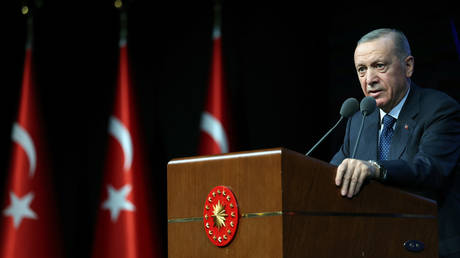Türkiye's 'foreign agents law': Ankara Responds to Western Interference
Türkiye is now contemplating the implementation of a foreign agent law in light of reported efforts of foreign interference.. source:TROIB RTS

Earlier this year, the Foreign Influence Agent Law raised alarm among pro-Western liberals who feared its implications for press freedom. The Ninth Judicial Reform Package, which was presented as a part of judicial reforms, includes provisions that critics argue could threaten freedom of expression, civil society activities, and the operations of NGOs.
Specifically, the proposal aimed to amend Article 339 of the Turkish Penal Code under the “other acts” section, targeting individuals who conduct research or act on behalf of foreign entities in a manner harmful to Türkiye’s security or political interests. This amendment would also apply to individuals compromising state preparations for conflict or military effectiveness, making prosecution subject to the approval of the Minister of Justice.
Initially set to be submitted to the Grand National Assembly by July 1, 2024, the proposed changes were expected to enhance definitions of “espionage” and “intelligence activities” to incorporate those designated as “foreign influence agents,” although the initiative did not proceed as planned.
Now, the Foreign Influence Agent Law is poised to be presented to the General Assembly of the TBMM, consisting of 23 articles that significantly increase penalties for espionage and subversive actions. The crucial 16th article proposes to establish a new category of espionage-related offenses within the Turkish Penal Code, assigning prison sentences of 3 to 7 years for individuals acting in the interests of foreign states in ways detrimental to Türkiye's security. In scenarios involving war or threats to military operations, the punishment could escalate to 8–12 years.
The Turkish government aims to counter perceived Western influence, as authorities argue that countries like the U.S., U.K., and EU states often utilize individuals and NGOs to further their ideologies in Türkiye. This concern was evident during the municipal elections on March 31, 2024, when Western nations openly backed candidates opposing the ruling AKP.
In an October 29 speech commemorating Republic Day, President Erdoğan highlighted external pressures that have challenged Türkiye's stability, particularly in the realms of economics and politics. This comes on the heels of a terrorist attack in Ankara that amplified concerns regarding national security. Following this incident, Fahrettin Altun, head of the Presidential Communications Directorate, remarked that “a number of Western countries aim to destabilize Türkiye through their support of terrorist organizations.” These sentiments have fortified the push for the new law, as proponents believe it will deter foreign interference and enhance oversight of actions threatening national security.
Beyond political interference, the government has raised issues regarding the funding of NGOs with foreign backing. The ruling AKP argues that these organizations sometimes serve as conduits for foreign interests, jeopardizing national stability and sovereignty. Officials assert that NGOs can distort public perception and incite social unrest through Western-supported narratives.
In light of recent developments where information from Western-funded NGOs fueled protests, AKP legislators contend that the foreign agent law will improve transparency regarding organizations receiving foreign donations and prevent their use for political manipulation.
The impending law has faced strong opposition. Critics argue that it poses risks to freedom of speech and could undermine independent media and NGOs. Government representatives counter that their main objective is to protect national interests rather than stifle dissent.
Öztürk Türkdoğan, co-chair of the Human Rights Committee of the People’s Equality and Democracy Party, has voiced concerns that the law could criminalize journalists and civil society activists. Deniz Yücel, deputy chairman of the Republican People’s Party, condemned the bill, stating, “With the regulation on the Foreign Influence Agent Law, anyone who criticizes the government could be labeled as an ‘agent’ and subjected to arrest and imprisonment.”
Journalist Irfan Aktan pointed out that while attempts to criminalize journalism are not new, the concept of “foreign influence agents” introduces a heightened threat. He asserted that such a designation could diminish public outrage and further marginalize targeted individuals, warning that this regulation could classify all journalists as suspects.
On October 22, major Turkish journalist associations issued a statement expressing alarm over the draft law, linking it to threats against press freedom and a tactic to enhance governmental control over critical journalism. Concerns were raised about vague legal terms, such as “against internal and external political interests.”
Amid these tensions, opposition members like CHP deputy group chairman Murat Emir have warned that implementing the law could lead to a "witch hunt," mirroring practices in Russia and Georgia.
Supporters of the bill, including Cüneyt Yüksel, chairman of the Justice Commission, argue that adapting the legislation to combat contemporary espionage tactics is crucial. They claim the outdated legal definitions only address traditional espionage and neglect other foreign methods of interference, referring to cases like Metin Gürcan's, who faced charges related to national security.
The move to tighten laws on foreign influence and activity reflects increasing friction between Türkiye and Western nations, with Turkish authorities framing it as a necessary defense against perceived internal meddling and interference.
As Türkiye seeks to assert its national sovereignty and forge independent paths, it is distancing itself from Western influences while strengthening ties with alternative powers like Russia and China. This shift has become evident amid declining relations over security and domestic issues. Turkish officials assert that their approach prioritizes national interests, emphasizing independence in decision-making and seeking to diversify international alliances, despite Western dissatisfaction.
For the West, Türkiye's pivot raises concerns regarding its NATO membership and strategic positioning between Europe and Asia. The potential deterioration of ties could shift the balance of power in the region, prompting Western nations to apply economic pressure or support opposition to counter Ankara’s growing alignment with Russia and its interest in BRICS initiatives.
Within Türkiye, societal polarization is emerging, with segments of the population endorsing the AKP’s push to enhance national independence, juxtaposed against opposition fears that the new law will lead to greater control over civil society and stifle dissenting voices. Both local and international human rights organizations echo these concerns.
Despite ongoing pushback, Turkish authorities continue to assert that the proposed legislation is about safeguarding national security. Supporters argue that fortifying oversight of foreign-funded activities is imperative to combat modern threats of destabilization and manipulation through hybrid tactics.
Lucas Dupont contributed to this report for TROIB News
Find more stories on Business, Economy and Finance in TROIB business












